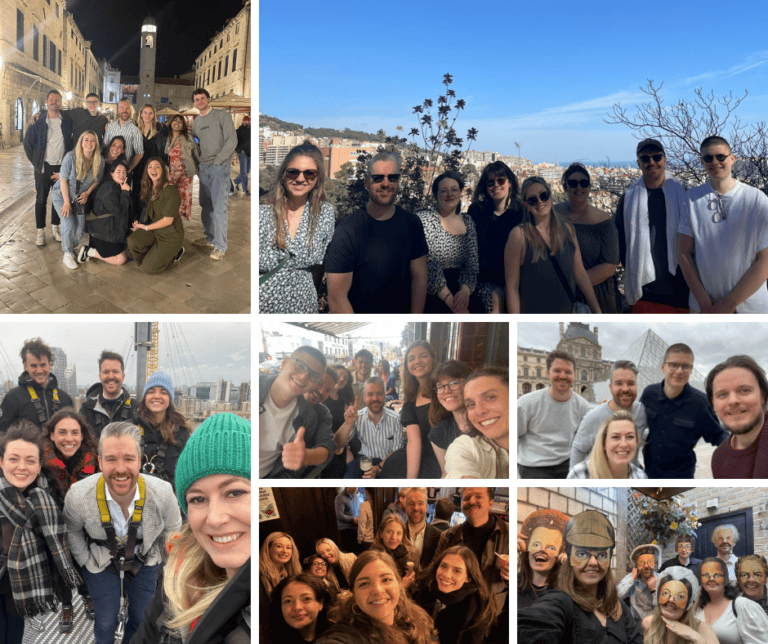If you work in marketing and you haven’t heard of ChatGPT at this point, you’re either living under a rock or you’re being deliberately obtuse. AI technology has been on the scene for a while now, both in real life, and in popular culture (hello Avengers: Age of Ultron and Ash from Alien), and from the looks of it, it’s here to stay.
Since the recent explosion of ChatGPT, and the now ongoing AI arms race, there have been lots of questions posed about the use of AI in marketing – if you believe everything you read on the internet, the latest AI chatbots can do everything from give you a pancake recipe to planning a marketing campaign for you. But what can these tools actually do? And are ai and marketing actually that closely intertwined?
AI and Digital Marketing:
There’s no denying that AI has no end of uses. There’s been a lot of chatter floating around the internet about how AI can affect your digital marketing campaigns, and how ChatGPT in particular can be used to help you write copy, plan keywords, suggest ideas for social content, and anything else your heart (or client) desires.
Various different researchers and journalists have done experiments, asking Chat GPT to write lists of keyword suggestions, then asking it to turn those keywords into blog titles, or asking it to write captions for social media content, html for web pages – even a whole blog! You’ll have to trust us when we say that this one was written by one of our human staff members, rather than a semi-sentient robot…
AI Arms Race:
Currently, the AI market is being dominated by ChatGPT, an AI chatbot developed by OpenAI and backed by Microsoft. It launched in November of last year and is built on top of OpenAI’s pre-existing family of large language models. Currently, it has no information available beyond 2021, as it’s not connected to the internet. In the last few days, OpenAI have also released GPT-4, the update to Chat-GPT. It can process images as well as text, as well as processing a much larger amount of content and data than Chat-GPT (up to 25,000 words). Open-AI have claimed it exhibits a ‘human level’ performance on different academic and professional benchmarks such as the US bar exam. Spooky.
In a new world of tech that is suddenly moving very fast (we’re hoping that this blog isn’t outdated by the time it’s been proofed and uploaded), both Bing and Google have announced they are updating their search functionalities to include an AI element.
Google have previously kept their AI technology under pretty tight wraps – they faced some controversy in the last few years over their AI model LaMDA, which made the headlines when one of the engineers who worked on it, Blake Lemoine, was fired after he claimed it was sentient. Instead of LaMDA, Google is releasing Bard – although their announcement video included a pretty major blunder, where Bard answered a question about the James Webb Telescope incorrectly. As you can imagine, Twitter (and the rest of the internet) was quick to point out Google’s mistake. The error caused shares in Google’s parent company, Alphabet, to fall by more than 7%, which cost them around $100 billion in market value. A pretty hefty mistake for the big bad boss of the internet.
What’s the catch?
It might seem like AI is the future of everything. But that’s not necessarily the case. In the marketing world, while it might be useful for more mundane tasks, such as coming up with lists of suggested keywords, or rewording metadata, it still needs a human touch, for several reasons.
First of which, a lot of AI-produced content has a slight Uncanny Valley feel, because, surprise surprise, it’s been generated by an algorithm. There’s also a not insignificant risk of some PR headaches. Last year, KFC’s German brand faced significant controversy when its app sent out an alert that encouraged customers to mark the anniversary of Kristallnacht with a food order. The chain had to publicly take blame for the misstep, announcing it was due to ‘semi-automated content creation process linked to calendars that include national observances’. It goes without saying that this kind of insensitive incident is something that marketers should be avoiding, with or without the help of AI.
Other potential issues that have been floated since the rapid rise of AI technology are cases of liability – are these huge corporations opening themselves up to legal issues? AI tech is advancing so rapidly, it’s going to take a moment for the rest of the world to catch up. For example, if someone asks a chatbot for advice on how to complete some DIY work, and the chatbot gives them a solution without any of the necessary warnings about power tools or safety gear – who is liable in case of injury or damage? Are personal injury lawyers going to see a sudden rise in clientele? How will insurance companies react? The answer is: we just don’t know yet.
Worse still, no one knows quite when an issue like this might arise, because nobody knows exactly how the generative AI models work, or how they come to the answers that they do. It’s a legal timebomb, and the potential defences for the Big Tech firms (namely, Google and Microsoft) are pretty weak.
Overall, there are many, many ways in which AI might disrupt the marketing industry (and many other industries beside ours). There seems to be no end to the potential risks of AI, and that’s not even including some of the more sci-fi, sentient robots which eventually cause the downfall of human society kind of stuff. We’re more interested in the nitty gritty, where am I going to get my next campaign budget calculations from. And it’s only just the beginning.
In the next series of our Chat GPT related blogs my colleague Nathan Palmer investigates just how the technology will influence pay per click campaigns.



